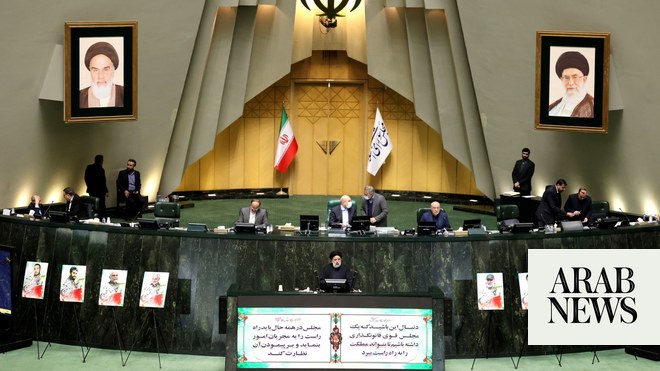
Domestic and external pressures mean the ruling regime in Iran is currently experiencing its toughest period since it came to power. We are now quickly approaching Iran’s parliamentary elections, which will be held in February 2020. They are expected to trigger and intensify political rivalries within the small and tight circles that control the Iranian regime. In addition, they are likely to indicate the direction of a more important upcoming political event: The next Iranian presidential election in 2021.
The parliamentary elections are among the most hotly debated issues within the theocratic regime’s inner circles. Iran’s post-1979 political history suggests that parliamentary elections shape the country’s political identity and provide a means to sense public sentiment concerning the regime’s policies and clear signs of the supreme leader’s choices for the coming government. Therefore, parliamentary elections can have a significant impact on the future of rival political factions, as the Guardian Council is empowered to vet candidates for Iran’s elections. However, with tensions within the Iranian regime increasing, as well as between its various factions, there is a possibility that the Guardian Council could be manipulated or exploited by one faction or another, resulting in certain candidates being qualified and others not.
At present, far more than in the past, the Iranian regime needs to not only show its enemies that it (supposedly) enjoys immense popular support in the region, but also convince its loyalists of the same thing, especially in light of the massive protests against Iranian interference in Iraq and Lebanon and its propping up of loyalist governments. Also, domestically, the Iranian regime needs to regain the confidence of its loyalists following the latest massive demonstrations across Iran itself, in which security forces reportedly killed up to 1,000 unarmed protesters. The regime is desperate to convince its loyalists that it still enjoys public support by re-establishing its fading legitimacy through the ballot box, which is always a source of endless controversy. Also, with the upcoming parliamentary elections taking place amid US economic sanctions, the regime is attempting to exploit the US “maximum pressure” strategy to portray itself as the victim of Western imperialism in a bid to gain public sympathy and support, as well as to solidify its own crumbling ranks.
Due to the aforementioned reasons, voter turnout in the upcoming parliamentary elections is of far greater importance to the Iranian leadership than in the past. In fact, we can conclude that voter turnout in these elections will have implications for the ongoing battle within the Iranian regime and the struggle that it is engaged in with its opponents at home and overseas. These elections will also reveal whether the Iranian regime was successful or not in rebuilding much-needed confidence among its loyalists, as well as whether or not it was capable of mobilizing the Iranian people to use the elections as a public platform to vent their anger against international pressures and to show their support for the political system. The leadership in Tehran is fully aware, however, that it cannot achieve its objectives naturally and must resort to subterfuge. For this reason, the regime is expected to mobilize its most hard-line supporters, especially the Basij, to demonstrate the imaginary grassroots support it enjoys; just as in the presidential election of 2009, when Mahmoud Ahmadinejad was granted a second term amid accusations of large-scale vote-rigging and election fraud.
Given the fact there are no neutral or impartial institutions that can supervise the elections, public suspicion over the regime’s fraudulent behavior during votes will continue to build and undermine the regime. From my point of view, the Iranian regime will attempt to hide its fraudulent behavior through images that will appear in the media, which is wholly controlled by the regime.
In addition, if, as usual, the coming Parliament is formed according to the supreme leader’s will, President Hassan Rouhani’s government will, most likely, face greater pressure in the coming two years. On the ground, Rouhani will be seen as the main culprit for Iran’s deteriorating socioeconomic conditions, which have worsened in recent weeks due to the price of gasoline rising, foreign currency volatility, and other economic issues.
The inability to predict the behavior of the Islamic Revolutionary Guard Corps and the extent of the control it wields over some of its factions further underlines the crucial importance and ambiguity of the upcoming period. We are also witnessing the run-up to the 2020 US presidential elections, which the Iranian leadership is keenly monitoring while assessing its policy options regarding a US administration that pulled out of the 2015 nuclear deal and reinstated sanctions on Iran. Election preparations in Iran and the US are taking place in the context of rising tensions in the Arabian Gulf in the aftermath of Iranian attacks in the region, the most recent being its September attack on Aramco’s oil facilities in Saudi Arabia.
The only hope for Tehran’s fast-fading regime is that the Trump era ends and a new US president, who pursues the same ineffectual “carrot” more than “stick” approach of former President Barack Obama, comes to power. However, the regime may be waiting a long time for this to happen.
• Dr. Mohammed Al-Sulami is Head of the International Institute for Iranian Studies (Rasanah). Twitter: @mohalsulami
Disclaimer: Views expressed by writers in this section are their own and do not necessarily reflect Arab News" point-of-view












